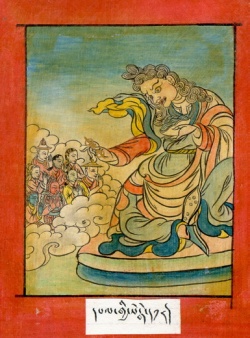Difference between revisions of "Lang Pelgyi Sengge"
| Line 1: | Line 1: | ||
[[File:3.Pelgyi_Sengge.jpg|thumb|250px|]] | [[File:3.Pelgyi_Sengge.jpg|thumb|250px|]] | ||
| − | |||
| − | |||
| − | |||
| − | [[Pelgyi Sengge]] fathered three sons and passed on the [[tantric teachings]] through them. His [[reincarnations]] include | + | |
| + | |||
| + | |||
| + | |||
| + | [[Pelgyi Sengge]] ([[dpal gyi seng ge]]), born into the [[Lang]] ([[rlangs]] / [[glang]]) {{Wiki|clan}}, was the son of [[Ame [Changchub Dekhol] (a mes [[byang chub 'dre khol]]), who had been a [[disciple]] of [[Padmasambhava]] and participated in the [[Buddhist]] subjugation of [[Tibetan deities]]. His mother was [[Jomo Kaldenma]] ([[jo mo skal ldan]] ma). | ||
| + | |||
| + | [[King Trisong Detsen]] sent [[Pelgyi Sengge]] to [[India]] to serve as a [[translator]]. | ||
| + | |||
| + | Later, [[Padmasambhava]] [[empowered]] [[Pelgyi Sengge]]; his [[flower]] landed on the [[maṇḍala of Jigten Choto]] ('[[jig rten mchog bstod]]). As the [[fruition]] of his practice, he came to be served by the eight groups of [[spirits]]. | ||
| + | |||
| + | While practicing [[meditation]] at [[Paro Taksang]] in [[Bhutan]], he received a [[vision]] of the [[wrathful]] [[buddha]] [[Trakpa Kundu]] ([[dregs pa kun 'dul]]), of the [[Jigten Choto Maṇḍala]], and subsequently achieved both common and uncommon accomplishments. | ||
| + | |||
| + | [[Pelgyi Sengge]] fathered three sons and passed on the [[tantric teachings]] through them. His [[reincarnations]] include [[Rabton Tobden Dorje]] ([[rwa ston stobs ldan rdo rje]], d.u.) and [[Dzogchen Drubwang Pema Rigdzin]] ([[rdzogs chen grub dbang pad+ma rig 'dzin]], 1625-1692). | ||
| Line 16: | Line 25: | ||
Bradburn, Leslie, ed. 1995. [[Masters]] of the [[Nyingma Lineage]]. Cazadero: [[Dharma Publications]], 1995, p. 44. | Bradburn, Leslie, ed. 1995. [[Masters]] of the [[Nyingma Lineage]]. Cazadero: [[Dharma Publications]], 1995, p. 44. | ||
| − | Smith, Gene. 2006. “[[Siddha]] Groups and the [[Mahasiddhas]] in the [[Art]] and {{Wiki|Literature}} of [[Tibet]].” In {{Wiki|Holy}} Madness: Portraits of [[Tantric | + | Smith, Gene. 2006. “[[Siddha]] Groups and the [[Mahasiddhas]] in the [[Art]] and {{Wiki|Literature}} of [[Tibet]].” In {{Wiki|Holy}} Madness: Portraits of [[Tantric Siddhas]]. [[New York]]: {{Wiki|Rubin Museum of Art}}, pp. 71-72. |
[[Tarthang Tulku]]. 1975. Bringing the Teachings Alive. Cazadero, CA: [[Dharma Publishing]], pp. 65-66. | [[Tarthang Tulku]]. 1975. Bringing the Teachings Alive. Cazadero, CA: [[Dharma Publishing]], pp. 65-66. | ||
| − | [[Gu ru bkra shis]]. 1990. Gu bkra'i | + | [[Gu ru bkra shis]]. 1990. [[Gu bkra'i chos 'byung]]. {{Wiki|Beijing}}: [[Krung go'i bod kyi shes rig dpe skrun khang]], p. 170. |
'[[Jam mgon kong sprul blo gros mtha' yas]]. 2007. [[Gter ston brgya rtsa]]. In [[Rin chen gter mdzod chen mo]]. {{Wiki|New Delhi}}: [[Shechen]], v.1 p. 382. | '[[Jam mgon kong sprul blo gros mtha' yas]]. 2007. [[Gter ston brgya rtsa]]. In [[Rin chen gter mdzod chen mo]]. {{Wiki|New Delhi}}: [[Shechen]], v.1 p. 382. | ||
Latest revision as of 18:14, 15 December 2015
Pelgyi Sengge (dpal gyi seng ge), born into the Lang (rlangs / glang) clan, was the son of [[Ame [Changchub Dekhol] (a mes byang chub 'dre khol), who had been a disciple of Padmasambhava and participated in the Buddhist subjugation of Tibetan deities. His mother was Jomo Kaldenma (jo mo skal ldan ma).
King Trisong Detsen sent Pelgyi Sengge to India to serve as a translator.
Later, Padmasambhava empowered Pelgyi Sengge; his flower landed on the maṇḍala of Jigten Choto ('jig rten mchog bstod). As the fruition of his practice, he came to be served by the eight groups of spirits.
While practicing meditation at Paro Taksang in Bhutan, he received a vision of the wrathful buddha Trakpa Kundu (dregs pa kun 'dul), of the Jigten Choto Maṇḍala, and subsequently achieved both common and uncommon accomplishments.
Pelgyi Sengge fathered three sons and passed on the tantric teachings through them. His reincarnations include Rabton Tobden Dorje (rwa ston stobs ldan rdo rje, d.u.) and Dzogchen Drubwang Pema Rigdzin (rdzogs chen grub dbang pad+ma rig 'dzin, 1625-1692).
Sources
Bradburn, Leslie, ed. 1995. Masters of the Nyingma Lineage. Cazadero: Dharma Publications, 1995, p. 44.
Smith, Gene. 2006. “Siddha Groups and the Mahasiddhas in the Art and Literature of Tibet.” In Holy Madness: Portraits of Tantric Siddhas. New York: Rubin Museum of Art, pp. 71-72.
Tarthang Tulku. 1975. Bringing the Teachings Alive. Cazadero, CA: Dharma Publishing, pp. 65-66.
Gu ru bkra shis. 1990. Gu bkra'i chos 'byung. Beijing: Krung go'i bod kyi shes rig dpe skrun khang, p. 170.
'Jam mgon kong sprul blo gros mtha' yas. 2007. Gter ston brgya rtsa. In Rin chen gter mdzod chen mo. New Delhi: Shechen, v.1 p. 382.
Arthur Mandelbaum August 2007
